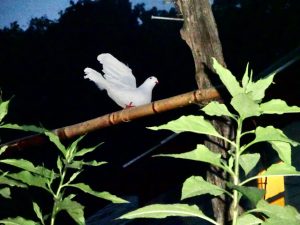In the wake of October 7, 2023 and its aftermath, the idea that Jews and Arabs might share a deep impulse to love one another, might seem absurd. Thus I have felt reluctant to share this story with the 72 blog88.org subscribers or to post it to iBrattleboro. Yet the profound reality is that the inclination to love is fundamental to human nature.
I have heard people say that it is governments which stir up hatred and violence. But a small group of “true believers” can ignite cascading violence, which draws in governments and escalates into war. In normal times, as neighbors, we may share a garden. But in another situation, I may feel the need to kill you as quickly as possible, before you can kill me.
On a personal note: Medical issues lately have absorbed my attention so that my normal desire to keep writing has waned. Now, having overcome my reluctance to share “My Yehudi Friend,” perhaps the creative juices will flow again, and you will start to hear more from me.
COMMENTARY: “My Yehudi Friend”
By Steven K-Brooks
Last time I visited NYC was 26 years ago. My son was 7, being brought up at the end of a very rural dirt road. So I was glad that he had a chance to see the skyscrapers.
We had traveled to the city for the wedding of my wife’s best friend.
My one unforgettable memory is standing on the steps of the synagogue, wearing a white shirt with a yarmulke on my head, when an Arab man and woman walked by. The guy gave me such a hate look as to be unforgettable a quarter-century later.
Such a shame for someone to think they know how deserving of hate you are because they have identified you by your group.
This incident stands in sharp contract with an experience I had in 1977, when Egyptian President Anwar Sadat visited Jerusalem in an extraordinary gesture of peace.
Earlier that year, I had met a Yemenite fellow named Ali. I was living then in Buffalo, N.Y. In Buffalo, there were a number of neighborhood “bodegas” owned by Arabs, which is where I met Ali. I do not recall how it came up, but somehow I was identified as a Jew. Ali asked me: “Why do Jews hate Arabs?”
I was astounded and replied: “I’m Jewish, and I don’t hate Arabs.” Ali looked skeptical, like he did not trust my words. But a woman, also behind the counter (perhaps his sister or his wife), upon hearing me say that, just looked at me with so much love in her eyes that I knew she believed me and appreciated my sentiment.
Over time, Ali got used to me, and he started to call me “Cuz,” short for “cousin,” meaning that Arabs and Jews are descended from brothers, Abraham’s sons.
On the day that Sadat visited Jerusalem, I ran into Ali at a different grocery store about a mile from his, also owned by an Arab. Ali introduced me to the store owner: “This is Steve, my Yehudi friend.”
We hung out that afternoon, and over the course of the next few hours, other friends of Ali came by, and to each one, Ali introduced me as his Yehudi friend. That afternoon, as Ali’s friends came by, I was introduced as Ali’s Yehudi friend to 23 Arab guys. These fellows came from various countries.
Ali introduced me to a Jordanian guy. With pride, he told me that this fellow received a medal for killing a large number of Jews during one of the wars. The Jordanian fellow shut him up, embarrassed, not wanting that to be the focus on this day of peace.
This Jordanian fellow invited me to sit in his car along with himself and 3 other Arab guys listening to cassettes of Arab music. The one song which they particularly wanted me to hear, was sung by a woman whom they told me is the most popular singer in Egypt. The song was called “Peace in Al Quds,” which means “The Holy,” and is the Arab name for Jerusalem.
Another fellow, when introduced to me, proudly proclaimed: “I am an Egyptian!” After he left, Ali said to me: “I don’t know why he said he is an Egyptian. He is from Yemen.” I knew why: The fellow meant, “I am with Sadat in the quest for peace.”
One fellow chastised Ali, saying that Ali drinks beer and is therefore, not a good Muslim. This fellow was not warm to me, and my guess is that he was really chastising Ali for calling me his Yehudi friend.
Of these couple of dozen young Arab men I met that afternoon, only three reacted negatively toward me, but the encounters were overwhelmingly enthusiastic. I felt and still feel that the basic human instinct is to love one another and that war and killing is an aberration caused by situational danger and fear. In Buffalo, we could enjoy one another; in Jerusalem during wartime, things could be quite different.
When I now recall the guy who gave me the hate look as I stood on the steps of the synagogue, I wish I had thought of saying to him, “a salam alaikum,” which in Arabic means, “Peace be unto you.”
Retired from active real estate brokerage, Steven K-Brooks lives in Brattleboro and writes on Blog88.org. Contact him at IntoxicatingWriting@gmail.com.






Cousins
Thus writing reminded me of a statement by the (Arab) Lutheran Pastor Mitri Raheb from the West Bank:
“We are cousins! Don’t you know?”
since jews gang-rape arabs to the point of paralysis in the name of self-defence
notions of friends of family are quite ridiculous